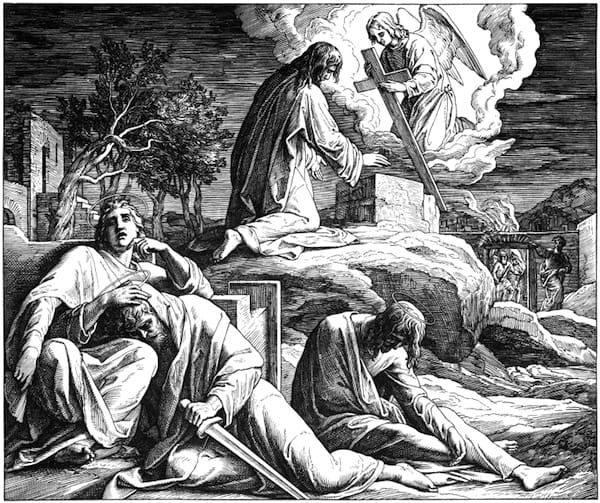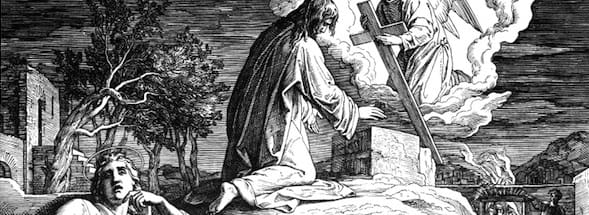 permitted to overhear part of the Son’s conversation with the Father in secret. Extending the blessing He offered at the Last Supper, Christ offered perfect praise with bold confidence in the Father while cherishing everything about his human existence, especially His friends. He was vigilant that they should not be lost, but instead that they should have life to the full. Though the terror of that night did not spare Him extreme anxiety, an attitude of complete readiness and excessive generosity permeated the resounding silence that He offered to the Father in humble prayer. (See Luke 22:39-46 as well as Mark 14:32-42, and Matt. 26:36-46.)
permitted to overhear part of the Son’s conversation with the Father in secret. Extending the blessing He offered at the Last Supper, Christ offered perfect praise with bold confidence in the Father while cherishing everything about his human existence, especially His friends. He was vigilant that they should not be lost, but instead that they should have life to the full. Though the terror of that night did not spare Him extreme anxiety, an attitude of complete readiness and excessive generosity permeated the resounding silence that He offered to the Father in humble prayer. (See Luke 22:39-46 as well as Mark 14:32-42, and Matt. 26:36-46.)His most intimate prayer, in the context of Passover, did not seek to surmount the nobility of human aspirations or avoid those intense fears that arise from man’s precarious place in a violent world. Nor did He withdraw from or try to by-pass the depths of misery that his human nature allowed Him to drink in. Instead, He blessed the Father with every fiber of His embodied existence and in this effort offered heart-felt petitions. He interceded with all his strength in wrenched anguish for those He loved. His prayer is infallible. It was through this divine movement of His human heart that we are consecrated by the truth.
The hypostatic union of humanity and divinity in the Son of God means that the Lord’s Divine Will exploded with power within the freedom of His human will, His Divine Understanding constantly flashed out with blinding brilliance within the limits of His human understanding. Thus, with unceasing prayer did He make the blind see while those who thought they saw were left blind.
It is a beautiful mystery that the Fathers of the Church called theandric: what He did as God, He did humanly; what He did as man, He did divinely. His prayer was not an effort to overcome, to annihilate or to absorb human nature by attaining some enlightened consciousness beyond consciousness. Instead, He prayed in, through and for humanity, binding to Himself all its uncertainty, disappointment, regret and heartache. Through the Church to whom He confided Himself in Eucharistic covenant, this same mystery is extended into the prayer of His disciples.
This awesome mystery speaks to the nature of Christian contemplation. This is why the prayer of the Redeemer is at once a terrifying mystery and a mystery of unfathomable hope in our daily life. With faith in Christ’s beatific gaze and bloody sweat, Christians learn to behold the whole of human misery, the overwhelming cost of our redemption and, at the same time, the unbounded excessive-ness of the Father’s love for each soul.
It is a piercing, disturbing and overwhelming contemplation revealed in Gethsemane and accomplished on Golgotha. If His prayer suffered the limitlessness of the Father’s love in the limits of the human heart, so too our own frail efforts to trust the Father. If the boundaries of his human reason were unremittingly plunged in the light of Divine Understanding, so too does our own contemplation baptize us in dark waters of painful tribulations and puzzling trials. If the frail vulnerable movement of his human liberty confronted in itself with complete integrity the gentle but eternal power of Divine Freedom, we too struggle to find the courage to follow in the footsteps of our Crucified Master.
In the prayer of Christ, the baptized are offered a cup of which each sip means a further surrender of one’s desire for self-preservation, and this with the hope of salvation. The Son of God has assumed human nature in a manner by which the gift of faith opens the depths of the human person to this new kind of existence, a trusting existence. He not only reveals the truth against which one can renounce all those false efforts to save oneself, but He also gives the grace to offer, like He did, the unique and unrepeatable truth about one’s very own self to God. In this prayer, humanity is not left behind or surmounted: it is elevated beyond itself, above what it finds comfortable or satisfying, far above what it can manipulate or control, up into an awesome hope-filled night, a Gethsemane in which alone it can find refuge.
What a paradox! This brilliant night of the Mount of Olives, the same ineffable darkness that covered both Sinai and Tabor, is not dark in itself but inaccessible to the natural powers of reason, intuition and feeling. Our own efforts are not sufficient to welcome this hidden grace. Only an exquisite but difficult gift helps us keep this vigil. Only prayer baptized in Christ’s own silence can contemplate the Holy Trinity hidden in this radiant cloud of divine splendor. Faith alone knows, especially when it feels the moment of abandonment that the Lord felt, that this painful night is no nihilistic emptiness, but the loving in breaking of Eternal Life won for us by Christ. Those who enter Gethsemane’s night taste, without knowing it, a pledge of future glory: the Eucharist of the Church lives in their hearts.
By the Eucharist, the mysterious prayer of the Lord lives in our effort to pray. For those who engage their hearts and minds in the sacrificial banquet, the prayer of Gethsemane cannot long remain a static artifact tucked away in the back of the baptized mind. This living reality constantly implicates the whole of humanity in the Father’s merciful love in the present moment entrusted to us. With our perseverance in faith, Christ’s cry to the Father in us effects radical vulnerability and complete trust in the goodness and wisdom of the Father’s plan — no matter our personal plight or the plight of those we love. Here, the prayer of the Word made flesh is not merely an example for us to follow. His prayer is a principle that animates our prayer – making it right and just.




